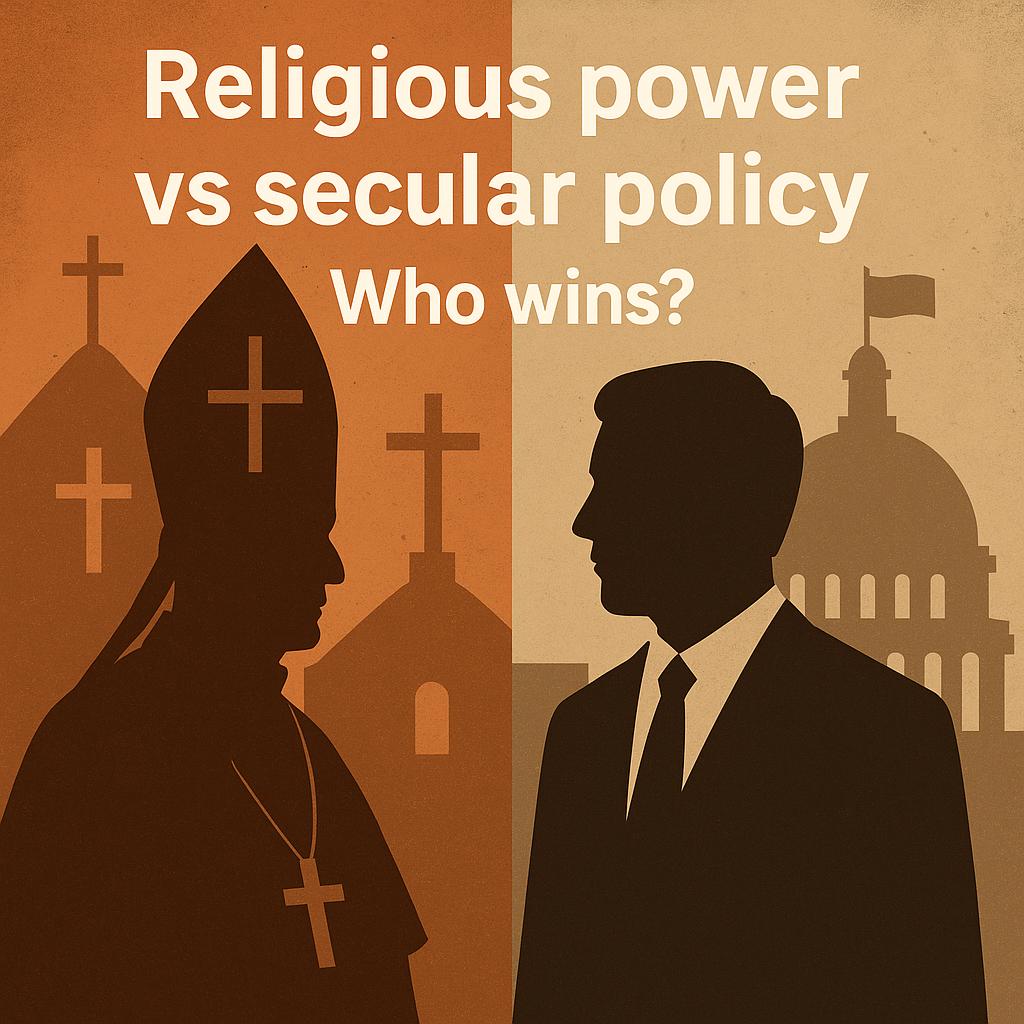Throughout history, human societies have swung between religious authority and secular governance. The lines have never been clean. Some states built on divine right later birthed democracy. Others that claim secularism enforce religious dogma through policy. This article explores who really holds the reins of power—and why the conflict remains unresolved in modern times.
The historical collision: Church vs state
In ancient civilizations, religion and state were one. Pharaohs ruled as gods. Roman emperors became divine. Even in Greece and Rome, where secular courts emerged, religion remained a public obligation.
As Christianity gained dominance, it fused with political power. Medieval Europe witnessed caesaropapism, where rulers claimed both secular and religious control. The Reformation shattered this unity, replacing one Church with many, each aligning with different states.
The Enlightenment brought new energy. Thinkers like Locke, Voltaire, and Jefferson demanded a wall between church and state. Yet even as constitutions codified this ideal, the battle never ended.
Secularism’s Golden age—and its limits
The 19th and 20th centuries saw secularism bloom. France’s 1905 law of laïcité established strict separation. The U.S. First Amendment offered freedom of religion—and from religion. India, despite its diversity, sought principled distance between faith and law.
But secularism is fragile. In practice, many democracies mask deep religious bias. When secularism challenges tradition or privilege, it retreats. Performative neutrality replaces true independence. And in many countries, political parties use religion as an emotional appeal to stir loyalty.
Religious lobbying: Quiet power in democracies
While secularism remains the law, religious groups write the rules behind closed doors. In the U.S., Christian conservatives spend millions lobbying lawmakers. They influence education standards, health laws, and even foreign policy.
Family Policy Councils push anti-LGBT agendas. Evangelical donors shape judicial appointments. Catholic lobbies fight abortion rights. Hindu nationalists in India push anti-conversion laws. Israeli politics are influenced by ultra-Orthodox coalitions. In Poland, the Church’s influence over family laws remains significant. This lobbying is often hidden, but highly effective.
Secular systems co-opt Religious influence
Governments often invite religion into public life to consolidate control. From Trump’s promotion of Christian values in federal agencies to India’s ruling party exploiting Hindu symbolism, secular states use religion to deepen loyalty.
Education is a key battlefield. Oklahoma’s Project 2025 integrates Christian ideology into schools. In some U.S. states, science curricula are shaped by creationist beliefs. Courts, textbooks, and public symbols often favor dominant religions, despite secular constitutions. In Russia, the Orthodox Church provides legitimacy to the Kremlin. In Iran, secular technology policies are cloaked in religious justification.
When religion shapes policy outcomes
Policy often reflects theology more than evidence. U.S. abortion bans mirror conservative Christian beliefs. Anti-LGBT laws in Africa echo evangelical missions. In Pakistan and Nigeria, Sharia courts influence criminal sentencing.
Assisted dying debates in the UK and Canada show religion’s grip on ethical policymaking. Often, religious morality overrides public consensus. Even vaccination campaigns face resistance when framed through religious lenses.
When secular policy sparks religious backlash
Secular reforms provoke resistance. Bans on religious dress trigger protests. LGBTQ+ rights spark backlash. Secular education draws accusations of “moral decay.”
This fuels religious nationalism. Hindutva in India, Zionism in Israel, Evangelicalism in the U.S.—all claim moral authority. They promise a return to purity, using religion as political identity. In Turkey, the headscarf ban once symbolized secularism, now its reversal symbolizes national pride. In France, laïcité clashes with Islamic communities, escalating tension.
Elites playing both sides
Powerful elites manipulate both camps. Politicians invoke religion for legitimacy, while religious leaders seek state protection. Billionaires fund both liberal and conservative causes, hedging their bets.
Religious exemptions from taxes, government funding for faith schools, and silence on abuse scandals reveal a covert alliance. Elites play secularism as a card—but rarely believe in it. Institutions like the Vatican Bank, evangelical media empires, or Saudi religious endowments are also major economic actors.
The Global puzzle: Secularism in diverse forms
Secularism is not one-size-fits-all. France enforces laïcité strictly. The U.S. pretends neutrality but favors Christianity. India balances religious freedom with state interference.
Some states, like Turkey, oscillate. Others, like Russia, blur church and state intentionally. China promotes atheism but co-opts state-approved religion for control. In Scandinavia, religion fades culturally but retains ceremonial presence. The idea of a secular order varies by context and often exists more on paper than in practice.
The future landscape: Integration, conflict, or transformation?
Institutional religion is declining in the West, but not vanishing. Digital communities reinvent faith. Religious movements now span borders.
Will secularism evolve into a pluralist model protecting all beliefs? Or will the culture war intensify? Can policies integrate religion without favoring it? Or will populism weaponize faith further?
AI, globalization, and climate change may force new alliances. Automation and pandemics stir existential fear—opening doors to new theologies. But the core tension will remain: should law reflect reason, or revelation?
Conclusion: The real victor
There is no permanent winner. The battle between religious power and secular policy will persist because it reflects a deeper conflict: who defines truth?
Some seek answers in scripture, others in science. Some obey tradition, others challenge it. But in every age, elites use both sides to maintain control.
Freedom will not come from the Church or the State. It comes from the mind—from citizens who demand reason, compassion, and justice beyond ideology.
True victory lies not in choosing sides, but in refusing to be ruled by either. The future demands vigilance, clarity, and courage—from those who want to think freely and live fully.

Leave a Reply